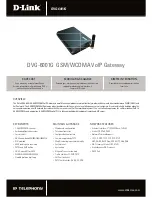
© ioSelect Inc.
CONFIDENTIAL
97
io
Select
EtherWave - WMR
6.0 Configuration
IP Protocol Config (continued)
Multicast is a one-to-many
transmission of data over an
IP network. It is an efficient
method of transmitting the
same data to many recipients.
The recipients must me
members of the specific
multicast group.
UDP Point-to-Point:
In this configuration the EtherWave-WMR will
send serial data to a specifically-defined point, using UDP packets.
This same EtherWave-WMR will accept UDP packets from that
same point.
·
Remote IP Address
IP address of distant device to which UDP packets
are sent when data received at serial port.
Default:
0.0.0.0
·
Remote Port
UDP port of distant device mentioned above.
Default:
20001
·
Listening Port
UDP port which the EtherWave-WMR listens to
(monitors).
UDP packets received on this port
are forwarded to
the unit’s serial port.
Default:
20001
UDP Point-to-Multipoint (P):
This mode is configured on an
EtherWave-WMR which is to send multicast UDP packets; typically,
the MASTER in the EtherWave-WMR network.
·
Multicast IP Address
A valid multicast address this unit uses to send
multicast UDP packets upon receiving data from
the serial port. The default value is a good
example of a valid multicast address.
Default:
224.1.1.1
·
Multicast Port
A UDP port that this EtherWave-WMR will send
UDP packets to. The Multipoint (MP - see the UDP
Point-to-Multipoint (MP) description) stations
should be configured to listen to this point in order
to receive multicast packets from this EtherWave-
WMR.
Default:
20001
·
Listening Port
The UDP port that this unit receives incoming data
on from multiple remote units.
Default:
20011
·
Time to Live
Time to live for the multicast packets.
TTL: Time to Live is the
number of hops a packet can
travel before being discarded.
In the context of multicast, a
TTL value of 1 restricts the
range of the packet to the
same subnet.
















































